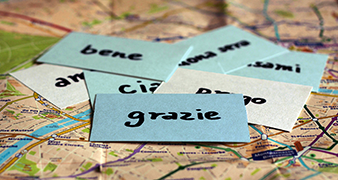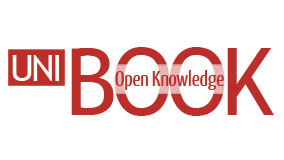Benvenuti in Italia! Orientarsi con l'italiano - Part 2

Italian as a second language with e-LOCAL (Electronically Learning Other Cultures and Languages)
Course description
This beginner’s course, stemming from the European project e-LOCAL (Electronically Learning Other Cultures And Languages), will guide you into the discovery of Italian language and culture. The main characters of the course are Anna and Alex. They are two Erasmus students who arrive in Bologna. Anna and Alex are welcomed in their university town by Lorenzo and Lucia and are helped in their learning process by Elena and Giovanni. The course is divided into 2 parts, part I and part II. In this second part, you will continue to follow Anna and Alex in their adventures and discover the Italian language and culture with them.

As for Part I, Part II is also organised in 4 main units,, plus an introductory unit and a final assessment unit. The introductory unit is the same as in Part I of the course, and it is repeated just to revise some preliminary information. In units 5-8 (the numeration continues after Part I) you will find a story with seven situations and a comprehension quiz at the end; grammar explanations along with related exercises; cultural pills with short tests and everyday information; language exercises to fix grammar, lexicon and communicative aspects. You will also find a final unit with the assessment of the course.
In each part of the course, where necessary, you will find a specific glossary, but please remember that you will always have the Overall Glossary at your disposal. This contains all the vocabulary used in the course. You will also be able to download the Overall Grammar, which includes all the grammar explanations of the course. You can find both the Overall Glossary and the Overall Grammar in the Additional Materials.
Estimated Effort (hours per week): 8-10h per week 4 to 5 weeks totally
This MOOC is organised in 4 weeks (1 unit = 1 week), plus the final assessment. Units 5-8 are the core of the course. On average, you should expect to spend 8-10 hours on each core unit. You should also expect to spend 2 hours on the final assessment unit. Remember in any case that this course is flexible: the amount of time, as well as its distribution, is up to you. The more time you devote to the course and the more regularly you use it, the better you will learn Italian. Take your time, take enough time. Are you ready to start your adventure? We wish you a pleasant discovery!
Pre-requisites
Basic knowledge of English as it is the language of instruction of the course; having taken Part I of the course is not compulsory but it is strongly recommended
Discussion forum
The forum of this MOOC is freely accessible and participation is not guided; you can use it to compare yourself with other participants, or to discuss course contents with them.
Quizzes and scores
The course has several questions. Some of these questions will not be evaluated to complete the course. Instead, the Homework you will find at the end of each Unit and the Final Assessment you will find at the end of the course will be evaluated. The Homework, as a whole, weighs 20% of the final score; the Final Assessment weighs 80% of the final score. You can find the points assigned for each exercise just after the title of the exercise itself, while the number of the maximum attempts is indicated under each quiz. The correct answer will be shown once you have used all the attempts available. Remember, the system will record the result of your final attempt, not the best of your attempts.
Certificate of Accomplishment
The Certificate of Accomplishment will be released if you successfully completed the course by answering correctly to at least 60% of the evaluated questions. After completing the course, if you have reached the required score, you can download and print a certificate of participation. The certificate of participation is signed by professor Andrea Ceccherelli, scientific coordinator of the E-LOCAL project and courses. The Certificate of Accomplishment does not confer any academic credit, grade or degree.
FAQ
For further information, see FAQ page.
Course staff
This MOOC is the result of a successful collaboration between Politecnico di Milano and the University of Bologna.
It is based on the Italian course developed within E-LOCAL, a European project coordinated by the University of Bologna. Professor Andrea Ceccherelli is the scientific coordinator of the E-LOCAL project and courses. The E-LOCAL course of Italian language and culture was created by:
- Silvia Baroni, ICTS Rosa Luxemburg, Italy (e-Story; e-Life texts units 1, 3, 6, 7)
- Andrea Ceccherelli, University of Bologna, Italy (e-Story; e-Culture texts unit 2)
- Cristina Donà, ICTS Rosa Luxemburg, Italy (e-Story)
- Elisa Magnani, University of Bologna, Italy (e-Culture texts and exercises units 1, 7, 8; e-Life texts units 2, 8)
- Elisabetta Magni, University of Bologna, Italy (e-Grammar notes; e-culture texts unit 4; e-Life texts unit 4)
- Annalisa Planera, Tóth Árpád Gimnázium, Hungary (e-culture texts units 3, 5, 6; e-Life texts unit 5)
- Katalin Puskas, Tóth Árpád Gimnázium, Hungary (e-culture texts units 3, 5, 6; e-Life texts unit 5)
- Antonella Valva, University of Bologna, Italy (e-Grammar exercises; e-Culture exercises units 2, 3, 4, 5, 6; e-Life exercises; e-Language exercises; supervision)
The production and implementation of this MOOC was curated by Politecnico di Milano – METID, consistently with the competences in pedagogical design of the team and in collaboration with Antonella Valva from the University of Bologna.
Antonella Valva has collaborated with the University of Bologna since 2008 dealing with internationalisation and European projects. She was project manager of the E-LOCAL and the elocALL projects, she is at present project manager of the ILOCALAPP project. She was also tutor of Italian language at the University Language Centre and she is currently attending a PhD in digital humanities.
This MOOC could not exist without the precious support of Andrea Ceccherelli, Paola Salomoni and Alessandra Scagliarini (University of Bologna).
